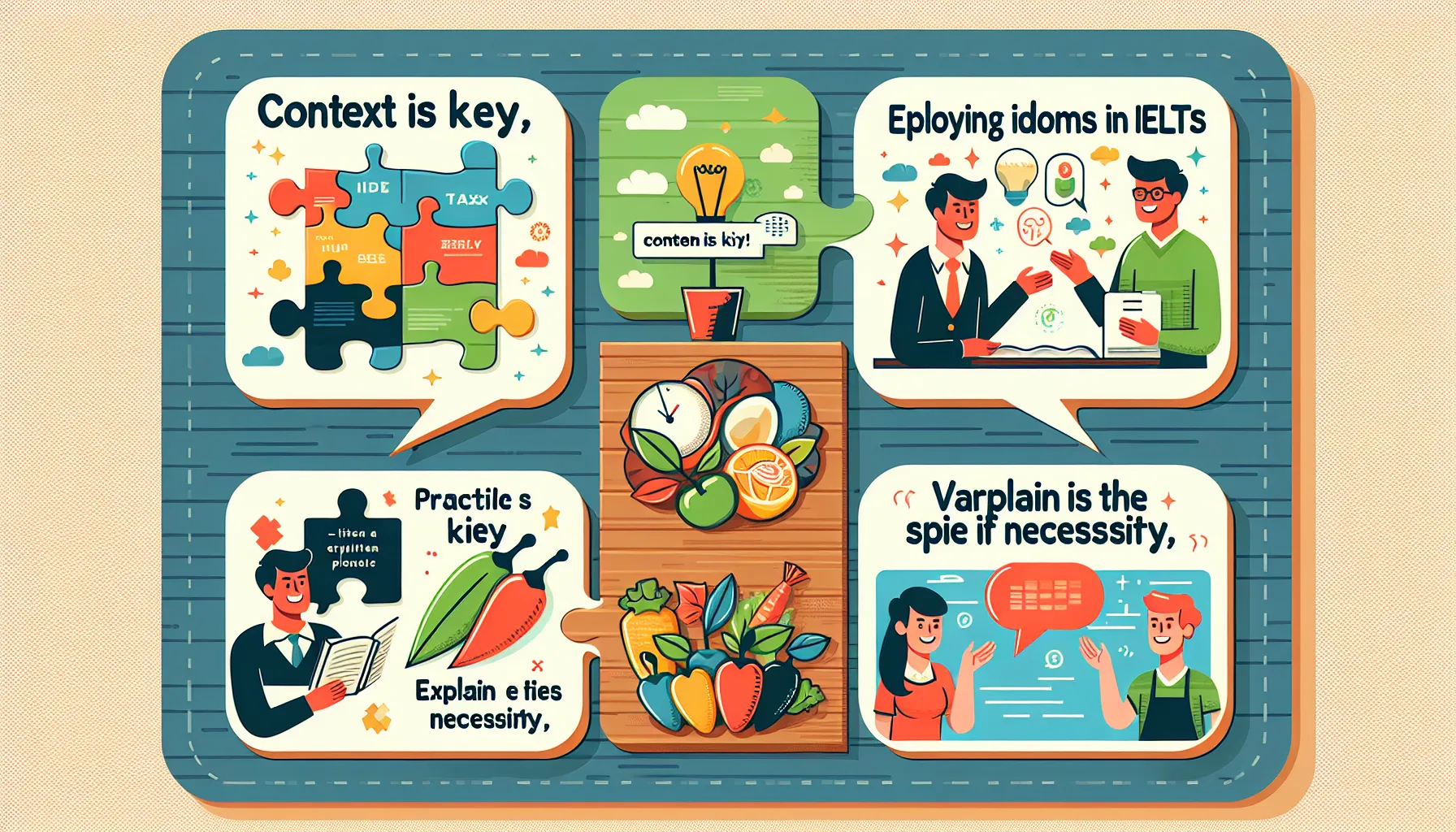Understanding the Importance of Idiomatic Expressions in IELTS Speaking
Idiomatic expressions play a crucial role in achieving a high band score in the IELTS Speaking test. These phrases demonstrate a sophisticated command of the English language and can significantly enhance your fluency and naturalness. By incorporating idiomatic expressions into your speech, you show the examiner that you have a deep understanding of the language beyond its literal meanings.
 Idiomatic expressions in IELTS Speaking
Idiomatic expressions in IELTS Speaking
Why Examiners Value Idiomatic Language
IELTS examiners are trained to look for candidates who can use English in a way that closely resembles native speakers. Here’s why idiomatic expressions are highly valued:
- Authenticity: They make your speech sound more natural and native-like.
- Vocabulary range: They demonstrate a broader vocabulary beyond basic or academic terms.
- Cultural awareness: Using idioms shows familiarity with English-speaking cultures.
- Flexibility: They allow you to express complex ideas concisely and effectively.
Top Idiomatic Phrases to Elevate Your IELTS Speaking Performance
1. Describing Situations and Experiences
- “It was a piece of cake” – To describe something very easy
- “I’m feeling under the weather” – To express that you’re not feeling well
- “It cost an arm and a leg” – To indicate something was very expensive
- “I’m over the moon” – To express extreme happiness
Example: “The first part of the exam was a piece of cake, but the essay section cost me an arm and a leg in terms of time and effort.”
2. Expressing Opinions and Attitudes
- “I’m on the fence about it” – To indicate indecisiveness
- “It’s not my cup of tea” – To express dislike or lack of interest
- “I’m all ears” – To show you’re ready to listen attentively
- “That’s music to my ears” – To express happiness about what you’ve heard
Example: “While some people are on the fence about remote work, I’m all ears when it comes to flexible working arrangements. It’s music to my ears when companies offer such options.”
 IELTS candidates practicing idiomatic phrases
IELTS candidates practicing idiomatic phrases
3. Discussing Challenges and Solutions
- “It’s a blessing in disguise” – To describe a seeming misfortune that turns out to be beneficial
- “I’m in the same boat” – To express that you’re in the same difficult situation as someone else
- “We’ll cross that bridge when we come to it” – To say you’ll deal with a problem when it actually occurs
- “It’s a double-edged sword” – To describe something that has both advantages and disadvantages
Example: “Losing my job was initially devastating, but it turned out to be a blessing in disguise. It pushed me to start my own business, which is now thriving.”
4. Talking About Progress and Achievement
- “I’m making headway” – To indicate you’re making progress
- “I’ve got it down to a fine art” – To say you’ve perfected a skill
- “I’m climbing the ladder” – To describe career progression
- “I’m burning the candle at both ends” – To express working very hard, often to the point of exhaustion
Example: “I’ve been burning the candle at both ends studying for IELTS, but I feel I’m making headway. My speaking skills, in particular, I’ve got down to a fine art.”
Strategies for Incorporating Idioms Effectively
1. Context is Key
Always ensure the idiom fits the context of your conversation. Misusing an idiom can be worse than not using one at all.
2. Practice Makes Perfect
Regularly incorporate these phrases into your everyday English conversations to make them feel natural when you use them in the test.
3. Variety is the Spice of Life
Don’t overuse idioms. Aim to use 2-3 well-placed idiomatic expressions throughout your speaking test.
4. Explain if Necessary
If you’re unsure whether the examiner understood an idiom, briefly explain its meaning to showcase your language awareness.
 Tips for using idioms in IELTS Speaking
Tips for using idioms in IELTS Speaking
Common Pitfalls to Avoid
- Overuse: Don’t try to use an idiom in every sentence. It will sound unnatural and forced.
- Incorrect usage: Make sure you understand the idiom’s meaning and how to use it correctly.
- Cultural insensitivity: Some idioms may be offensive in certain cultures. Stick to neutral, widely-accepted phrases.
- Memorization without understanding: Don’t simply memorize a list of idioms. Understand their meanings and appropriate contexts.
Next Steps: Practicing Idiomatic Expressions
- Create flashcards with idioms and their meanings.
- Watch English-language movies and TV shows, noting down idiomatic expressions you hear.
- Participate in English language forums or chat groups to practice using idioms in context.
- Take mock IELTS Speaking tests, consciously incorporating idiomatic expressions where appropriate.
- Ask a native English speaker or a qualified teacher to provide feedback on your use of idioms.
By mastering these idiomatic phrases and following the strategies outlined, you’ll be well on your way to achieving a high band score in your IELTS Speaking test. Remember, the key is not just to use these phrases, but to use them naturally and appropriately. With practice and dedication, you’ll soon find yourself speaking English with the fluency and naturalness of a native speaker.


